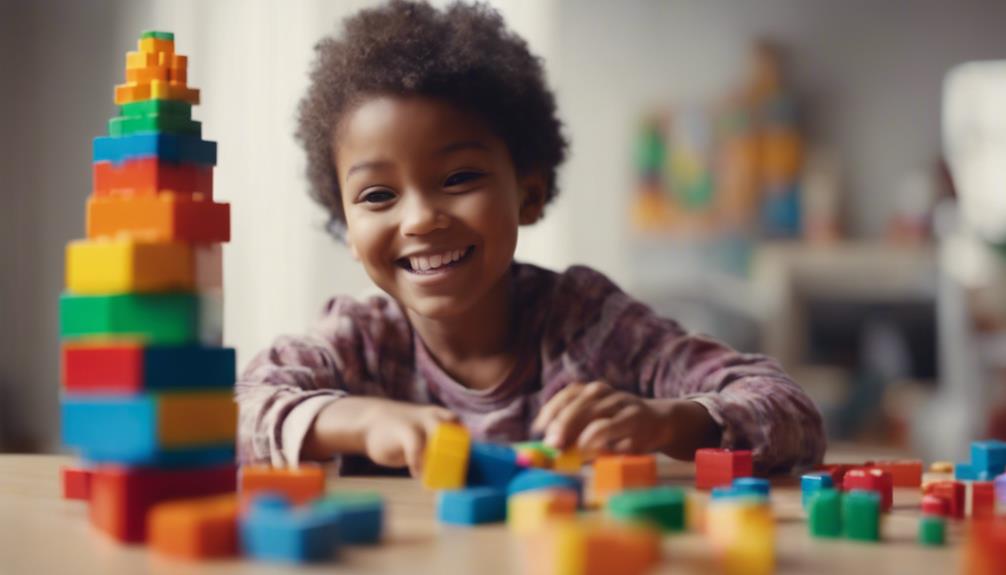When you turn everyday moments into teachable opportunities, you foster curiosity and critical thinking in children. Engage in simple activities like playing outside or exploring nature, and weave stories or ask questions to make these moments memorable. Use visual and tactile aids to boost understanding and inspire discovery. By actively transforming play into learning, you help children develop lifelong skills and a love for exploration. Keep exploring ways to make these everyday experiences even more meaningful.
Key Takeaways
- Transform routine activities like playing or exploring outdoors into engaging storytelling opportunities to foster learning.
- Use visual aids and tactile objects during play to enhance understanding and make lessons memorable.
- Ask open-ended questions during play to stimulate curiosity, observation, and critical thinking skills.
- Incorporate narratives into everyday moments, turning simple activities into adventures that deepen comprehension.
- Encourage exploration and inquiry through enthusiastic guidance, nurturing a love for discovery and lifelong learning.

Everyday moments present valuable opportunities to teach and connect with others, often more effectively than formal lessons. When you’re engaged in simple activities, such as playing with your child or exploring the outdoors, you can seamlessly turn these interactions into meaningful learning experiences. One powerful way to do this is by using storytelling techniques that captivate attention and make information memorable. Instead of just explaining facts, weave stories around the activity. For example, if you’re gardening together, tell a story about a tiny seed that dreams of becoming a big, strong plant. This approach not only makes the moment engaging but also helps your child grasp complex ideas through relatable narratives. Stories stimulate imagination and deepen understanding, making learning feel like an adventure rather than a chore. Incorporating visual aids or tactile objects into these moments can further enhance comprehension and engagement.
Moreover, these everyday interactions naturally spark curiosity, which is essential for meaningful learning. When you show enthusiasm and ask questions, you ignite a child’s desire to explore and discover. For instance, if your child notices a bird building a nest, you can ask, “What do you think the bird is doing? Why do you think it’s building the nest there?” This simple inquiry encourages them to think critically and encourages a sense of wonder. As they seek answers, they’re developing skills like observation, reasoning, and problem-solving—all during play. Harnessing curiosity in these moments turns ordinary play into rich learning opportunities, fostering a love for discovery that can last a lifetime.
Frequently Asked Questions
How Can Parents Identify Ideal Teachable Moments During Play?
To identify ideal teachable moments during play, you should observe your child’s engagement and assess their curiosity. Notice when they focus intensely or ask questions—these are clues they’re ready to learn. When they show enthusiasm or explore new ideas, seize those opportunities to introduce new concepts or skills. By paying close attention to their behaviors and interests, you create natural, meaningful teaching moments that foster growth and curiosity.
What Are Common Mistakes to Avoid When Turning Play Into Learning?
When turning play into learning, avoid overgeneralizing mistakes that can frustrate your child. Don’t neglect their interests, as forcing lessons they’re not curious about can backfire. Instead, stay attentive to their cues, keep activities engaging, and be flexible. Remember, the goal is to make learning natural and fun, not rigid or overwhelming. By respecting their curiosity and avoiding these pitfalls, you foster a positive, effective learning experience during playtime.
How Do Age Differences Affect Teachable Moments in Everyday Play?
Age differences influence teachable moments because age compatibility helps guarantee activities are engaging and appropriate. When play involves developmental gaps, you might find it harder to keep everyone involved or challenged. To maximize learning, tailor activities to suit different ages, encouraging older kids to mentor younger ones. This approach promotes understanding, patience, and shared growth, making everyday moments meaningful for everyone involved.
What Tools or Resources Support Spontaneous Teaching During Play?
Imagine your playtime toolbox bursting with treasure. Interactive apps act as guiding stars, lighting the way for spontaneous teaching, while educational toys serve as trusty companions, sparking curiosity and discovery. These resources transform simple moments into lively lessons, allowing you to seize teachable opportunities on the fly. With these tools, you turn everyday play into a fertile ground for learning, making each moment a new adventure in growth.
How Can I Encourage My Child to Explore New Concepts During Play?
You can encourage your child to explore new concepts during play by engaging in creative play together. Ask open-ended questions to stimulate curiosity and invite them to think creatively. Offer diverse materials and new challenges that spark their interest. Show enthusiasm for their ideas, which motivates exploration. Your active participation and curiosity stimulation help them feel confident to try new things, turning everyday moments into rich learning opportunities.
Conclusion
Everyday moments are your child’s greatest learning opportunities. By staying present and asking simple questions, you turn ordinary activities into valuable lessons. Did you know that children learn up to 85% of their language skills through daily interactions? So, next time you’re cooking, shopping, or playing, remember—these moments shape their future understanding. Embrace these teachable opportunities, and watch your child’s curiosity and skills grow naturally right before your eyes.










